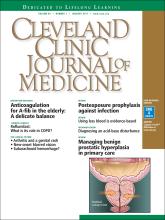Article Figures & Data
Tables
For predicting stroke risk in atrial fibrillation without anticoagulation therapy CHADS2—1 point each for congestive heart failure, hypertension, age ≥ 75, diabetes mellitus; 2 points for prior stroke or transient ischemic attack (possible points 6)2 CHA2DS2-VASc—1 point each for congestive heart failure, hypertension, age 65–74, diabetes mellitus, vascular disease (coronary artery disease, peripheral arterial disease, aortic aneurysm), sex category female; 2 points for age ≥ 75 and for prior stroke or transient ischemic attack (possible points 9)3 For predicting bleeding risk with anticoagulation therapy ATRIA—anemia, 3 points; severe renal disease, 3 points; age ≥ 75, 2 points; previous bleeding event, 1 point; hypertension 1 point (possible points 10); ATRIA stands for Anticoagulation and Risk Factors in Atrial Fibrillation study4 HAS-BLED—1 point each for hypertension, abnormal renal function, abnormal liver function, stroke, bleeding history, labile international normalized ratio, elderly status (age > 65), drugs, and alcohol abuse (possible points 9)5,6 HEMORR2HAGES—1 point each for hepatic or renal abnormality, ethanol abuse, malignancy, older age (> 75) reduced platelet function; 2 points for rebleeding risk; and 1 point each for hypertension (uncontrolled) anemia, genetic factors, excessive falls, and stroke (possible points 12)7






